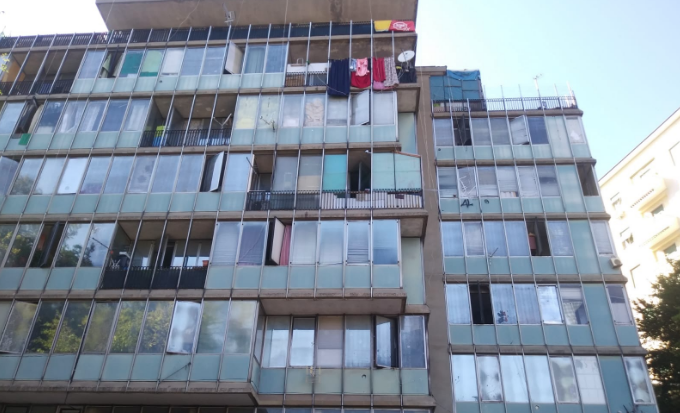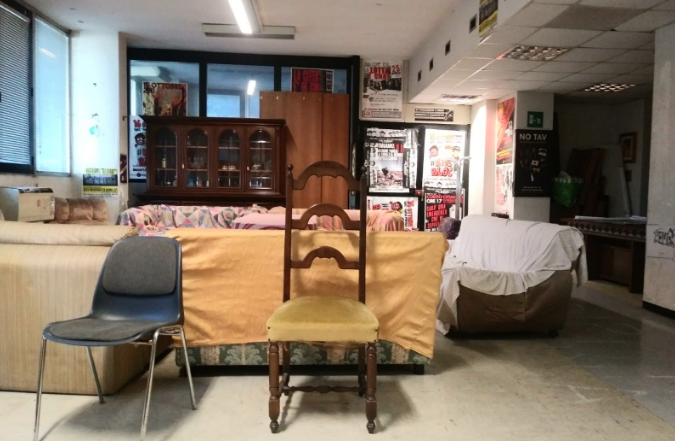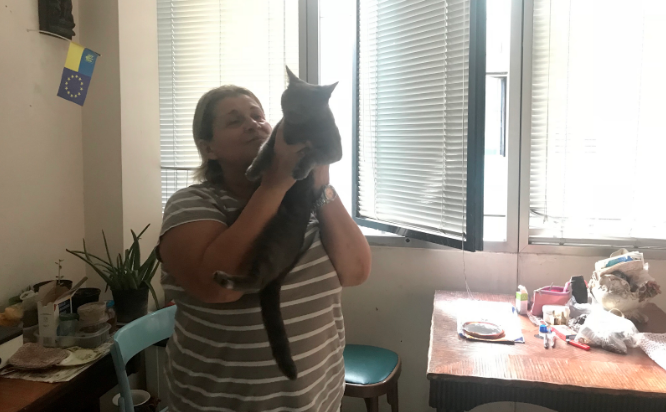
“Look at this one. This is me when I was young. Wasn’t I beautiful?” Naima, a 60-year-old woman from Tunisia, points at a portrait hung on the wall of her two-room apartment – a small space with cooker, table and sofa, and a bedroom – inside one of the biggest housing occupations in Rome, on the street Viale delle Province.
Since arriving in Rome 35 years ago, Naima has lived in this neighborhood. “I stayed in an apartment right there,” she says, pointing to the other side of the street from the window of the occupied building, where she has lived for the last five years.
This building was once used as offices for the National Institute of Social Security, but was abandoned for years. On December 6, 2012, it was occupied by a group called Blocchi Precari Metropolitani (BPM) who fight for the right to housing. That same day – labelled “Tsunami Tour” by activists – eight buildings were occupied around the city.
In just a few months, the buildings became home to people from all over the world: Italians, eastern Europeans, Africans, Latin Americans. Now, around 130 families live in the Viale delle Province occupation, including 60 children – and women are leading the fight for their right to housing.
“My husband and I had a small restaurant near the train station. We had a house and we paid rent. I did not have to worry about where I would sleep at night,” Naima tells me. But things changed: her husband died, she had to close the restaurant and started to work as a carer and domestic worker.
“I passed from one old woman to another,” she recalls. The physically demanding work caused a painful shoulder injury. “So when one old lady for whom I worked died, I didn’t find another job. And I didn’t find a place to live either.”

Naima first noticed the Viale delle Province occupation on a walk around the neighbourhood. “The people inside answered that it was possible to live here. I entered the building and they gave me a room,” Naima tells me.
“Living together with all our differences is not always easy, but we try. We use Italian as a common language,” she explains.
In the first weeks of the occupation, each family shared a room, with one or two bathrooms for each floor. After six months of collective work, each family was assigned an apartment, and the abandoned building began to look more like a house.
“This is a community that arises from a primary need: the need of a home,” Umberto, an Italian activist from BPM who lives inside the Viale delle Province building, tells me. “We fight to regain possession of something that has been taken from us. There are thousands and thousands families who are not able to afford a home.”
Housing problems are not new in Italy, but the situation was worsened by the 2008 global economic and financial crisis, says Umberto.
“New subjects started to live in the occupation: Italian families who once were able to pay rents and a whole class of immigrants who had lived and worked in Italy for 20-30 years, who could afford a house, but from 2008 saw their situation worsen considerably.”
According to research by the Italian Federation for Social Housing, 1.7 million Italian families have difficulties paying rent. The Ministry of Internal Affairs recently released data on evictions, which totaled almost 60,000 in 2017.
In Rome, there are now 7,000 evictions a year, involving 3,500 families. This means that 15 families are evicted from their homes every day, explains Massimo Pasquini, national secretary of the Tenants’ Union.
Four years ago, Alessandra was evicted from her house. She migrated from Ukraine 20 years ago and tells me: “I worked in a bakery workshop, but then they stopped paying me. All of a sudden I had no money to pay my rent.”
A friend told her about social movements for housing. “I decided to join the fight. And now I live here in the Viale delle Province occupation. And so do my sons and my grandsons. I share my apartment with my cat,” she adds, cuddling the animal. She shows me her apartment: “This place was a hole with rubble and dust. I worked a lot to make it decent.”

Mercedes was here the day the building was occupied. “I remember that we immediately organized patrol shifts, every four hours,” she says, taking turns to watch for police. She had moved to Italy from Ecuador with her family 16 years ago.
“We lived in a small house outside the city. But then my husband lost his job and he couldn’t find another one, so I was the only one working in the family. We had two daughters and €500 of rent [to pay],” she recalls.
Mercedes also heard about housing movements and talked to her husband about occupying a building: “He didn’t want to do it. But I was sure this was our only chance to survive. On 6 December 2012, I simply told him: we have to take a king size mattress at this address if we want to sleep all together. And so we did it.”
Umberto from BPM defines himself as “a long-time militant,” who “enjoyed many fights and movements” in his life, but he admits that “women’s role is crucial in the fight for the right to housing. They are always on the front line.”
Living in an occupied building means living with the constant fear of eviction.
Maria, a refugee from Eritrea, lives alone in a tidy room full of heart-shaped pillows. She’s afraid the police will throw her out. Alessandra reassures her, but admits: “This day will come. These are bad days for us.”
New Italian government policies are bad news for these women. In an official document released on 1 September 2018, the interior ministry said occupied buildings across the country must be cleared as soon as possible, without offering alternative housing solutions.
Three days later, the police evicted a building in Sesto San Giovanni (near Milan), the former headquarters of Alitalia (Italian national airline), occupied by 200 people.
A few days later, the same scene was repeated in the suburbs of Rome. “They came in at eight in the morning, crashing the doors and not giving us even the time to take our things,” said one of the people evicted from an occupation where he had lived for five years.
He said that authorities had “offered accommodation only to women and children, but we don’t want to be separated. We’d prefer to live in the streets, but together. They treat us like dogs, but we are people.”
Umberto confirms that this is the modus operandi of evictions: “They say they’ll find accommodation for fragile people, like pregnant women, old people, children or those who are ill. But this is usually a temporary solution. After a few months they are in the same situation.”
“The thought of a possible eviction is always with us,” Mercedes admits. “We don’t sleep well, we [also] have patrolling shifts at four or five AM. We need to be careful.”
Naima is afraid every time she hears the sound of a helicopter above her head. “Of course I think about the eviction, and I hope it will not happen”, she tells me. “But you know what? I am ready. I will chain myself to public buildings to have a roof over my head. I have nothing to lose: I am 60-years-old and I am ready to fight.”
Join us in defending the truth before it’s too late
The future of independent journalism is uncertain, and the consequences of losing it are too grave to ignore. To ensure Truthout remains safe, strong, and free, we need to raise $27,000 in the next 24 hours. Every dollar raised goes directly toward the costs of producing news you can trust.
Please give what you can — because by supporting us with a tax-deductible donation, you’re not just preserving a source of news, you’re helping to safeguard what’s left of our democracy.